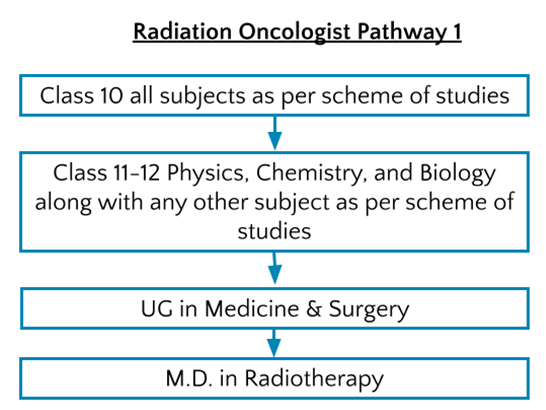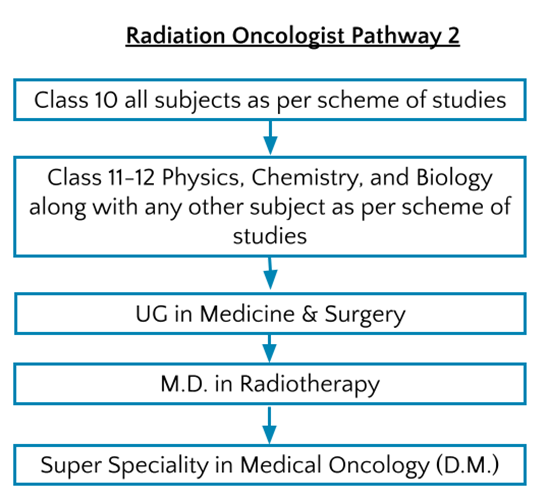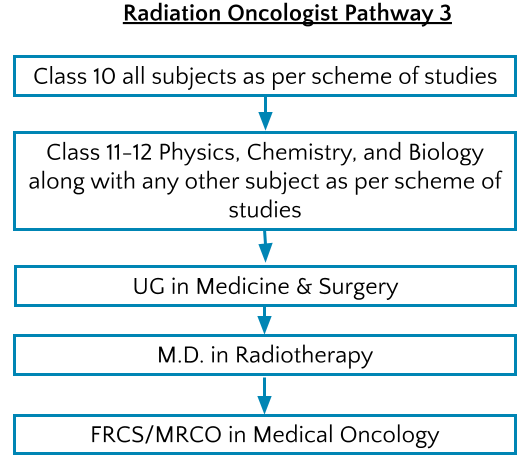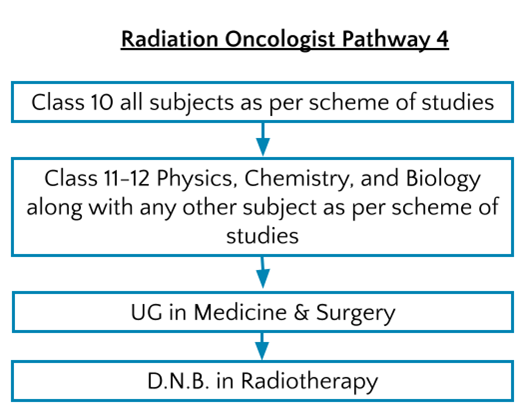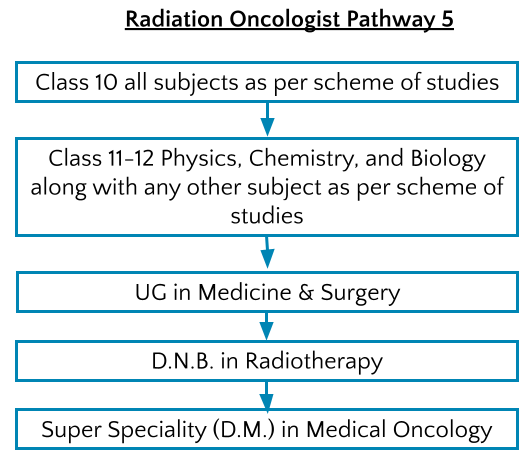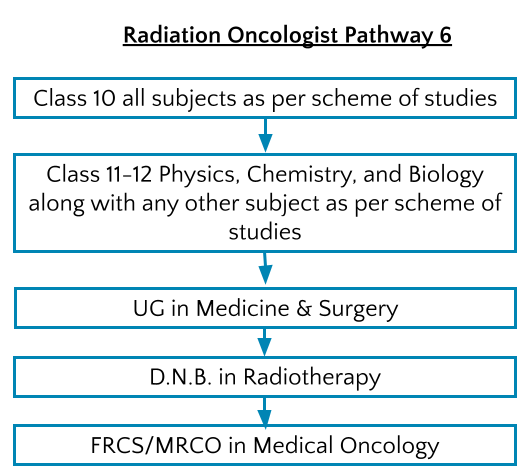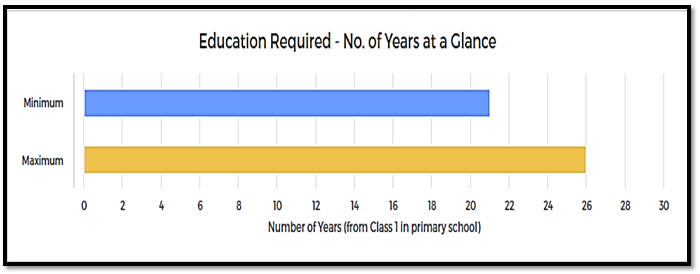Radiation Oncologist
Entry Level Qualification
12
Career Fields
Medical Services
For Specially Abled


About Career
1. A Radiation Oncologist is a specialist physician who uses ionizing radiation (such as megavoltage X-rays or radionuclides) in the treatment of cancer. Cancer treatment is carried through three kinds of specialties. A Radiation oncologist might treat a patient alone through radiation therapy or along with a medical oncologist through chemotherapy or along with a surgical oncologist with surgery. Sometimes, when the cancer is not curable, the radiation oncologist may use radiation therapy to relieve the patient from symptoms. Radiation oncologist also cures other types of tumours, especially benign tumours.
2. As a Radiation oncologist, you will primarily work closely with other physician’s likes surgical oncologists, interventional radiologists, internal medicine subspecialists, and medical oncologists, as well as medical physicists and technicians as part of the multi-disciplinary cancer team.
PARTICULARS | DESCRIPTION |
Name | Radiation Oncologist |
Purpose | Develop Treatment Plans |
Career Field | Allied & Para Medical Science |
Required Entrance Exam | No Entrance Exam |
Average Salary | 10,00,000- 15,00,000 Rs. Per Year |
Companies For You | Johns Hopkins Medicine, Cleveland Clinic, Radiation Oncology Centers & Many More |
Who is Eligible | Post Graduate |
Key Roles And Responsibilities
As a Radiologist Oncology, you will be required to perform several duties including the following:
1. You will need to consult with other physicians to ensure proper treatment evaluation and follow-up treatment.
2. You will perform accurate doses of radiation to the specific body parts of the patient using radiation therapy equipment as per the regulatory norms and standards.
3. You will write the daily progress report of hospitalized patients.
4. You will examine the patient when they are admitted, do the initial diagnosis, plan the treatment and ensure proper execution of the plan.
5. You will formulate a summary of discharge once the patient is discharged.
6. You will take actions only after taking consent from patients.
7. To take informed consent from the patient.
8. You will follow all principles of radiation protection for patient, yourself, staff present during the treatment.
9. You will review the prescription and change it as per the need.
10. You will perform most of the treatment session independently for long term benefit and under the direction of the patient’s physician.
11. You will ensure that your labs have enough facilities to take care of patients.
12. You will keep yourself updated with al latest research, developments, techniques in the field of radiology.
13. You will supervise all medical, paramedical and nurses and other staff of the department and push them to maintain high standards.
14. You will make sure that the quality of investigation and reports. You will also eliminate any errors in the procedure.
15. Once you have the results of the patient, you will communicate the result or diagnostics information with patients, their families, or other physicians involved.
16. You will ensure that all patient safety policies are followed within your department.
Career Entry Pathway
Class 10 all subjects as per scheme of studies – Class 11-12 Physics, Chemistry, and Biology along with any other subject as per scheme of studies – UG in Medicine & Surgery – M.D. in Radiotherapy
After your Class 10 all subjects as per scheme of studies pursue Class 11-12 Physics, Chemistry, and Biology along with any other subject as per scheme of studies, and then study for an undergraduate degree in Medicine & Surgery followed by M.D. in Radiotherapy.
Class 10 all subjects as per scheme of studies – Class 11-12 Physics, Chemistry, and Biology along with any other subject as per scheme of studies– UG in Medicine & Surgery – M.D. in Radiotherapy – Super Speciality in Medical Oncology (D.M.)
After your Class 10 all subjects as per scheme of studies pursue Class 11-12 Physics, Chemistry, and Biology along with any other subject as per scheme of studies, and then study for an undergraduate degree in Medicine & Surgery followed by M.D. in Radiotherapy. After the M.D. course, you can take a super specialty course (D.M.) in Medical Oncology D.M.
Class 10 all subjects as per scheme of studies – Class 11-12 Physics, Chemistry, and Biology along with any other subject as per scheme of studies – UG in Medicine & Surgery – M.D. in Radiotherapy – FRCS/MRCO in Medical Oncology
After your Class 10 all subjects as per scheme of studies pursue Class 11-12 Physics, Chemistry, and Biology along with any other subject as per scheme of studies, and then study for an undergraduate degree in Medicine & Surgery followed by an M.D. in Radiotherapy. After the M.D., you can take a course in the UK known as FRCS/MRCP in Medical Oncology.
Class 10 all subjects as per scheme of studies – Class 11-12 Physics, Chemistry, and Biology along with any other subject as per scheme of studies– UG in Medicine & Surgery – D.N.B. in Radiotherapy
After your Class 10 all subjects as per scheme of studies pursue Class 11-12 Physics, Chemistry, and Biology along with any other subject as per scheme of studies, and then study for an undergraduate degree in Medicine & Surgery followed by D.N.B. course in Radiotherapy.
Class 10 all subjects as per scheme of studies – Class 11-12 Physics, Chemistry, and Biology along with any other subject as per scheme of studies– UG in Medicine & Surgery – D.N.B. in Radiotherapy – Super Speciality (D.M.) in Medical Oncology
After your Class 10 all subjects as per scheme of studies pursue Class 11-12 Physics, Chemistry, and Biology along with any other subject as per scheme of studies, and then study for an undergraduate degree in Medicine & Surgery followed be a D.N.B. course in Radiotherapy. Then you can pursue a D.M. course in Medical Oncology.
Class 10 all subjects as per scheme of studies – Class 11-12 Physics, Chemistry, and Biology along with any other subject as per scheme of studies– UG in Medicine & Surgery – D.N.B. in Radiotherapy – FRCS/MRCO in Medical Oncology
After your Class 10 all subjects as per scheme of studies pursue Class 11-12 Physics, Chemistry, and Biology along with any other subject as per scheme of studies, and then study for an undergraduate degree in Medicine & Surgery followed by a D.N.B. in Radiotherapy. After the M.D., you can take a course in the UK known as FRCS/MRCP in Medical Oncology.
Required Qualification & Competencies
Undergraduate studies after school:
To become a Radiation Oncologist, you should complete your schooling with Physics, Chemistry, and Biology and join for an undergraduate course of M.B.B.S.
Doctoral studies:
1. After finishing M.B.B.S., you can opt for M.D in Radiotherapy.
2. Alternatively, you can also opt for D.N.B inRadiotherapy.
Post-Doctoral Studies:
1. After Completing M.D. or D.N.B., you can take a super specialty course known as D.M. in Medical Oncology.
2. Alternatively, you can study forFRCS/MRCP in Medical Oncology in the UK.
MINIMUM EDUCATION REQUIRED | MAXIMUM EDUCATION REQUIRED |
Doctoral All Ph.D. or equivalent degree programs for which the minimum eligibility is a Postgraduate or a Pre-Doctoral degree. | Post-Doctoral Post Ph.D. programs for which the minimum eligibility is a Doctoral degree. |
Competencies Required
You should have the following occupational interests:
1. Social - You should have interests for Social Occupations. Social occupations involve helping or assisting others; these involve working with and communicating with people to provide various services; these may involve educating and advising others.
2. Realistic - You should have interests for Realistic Occupations. Realistic occupations involve more practical and hands-on activities than paperwork or office work. Realistic occupations often involve physical activities for getting things done using various tools and equipment.
3. Conventional - You should have interests for Conventional Occupations. Conventional occupations involve repetitive and routine tasks as well as fixed processes or procedures for getting things done. These occupations involve working more with data, systems, and procedures and less with ideas or creativity.
Following personality attributes are required:
1. You are always or mostly organised in your day-to-day life and activities.
2. You are always or mostly disciplined in your action and behaviour.
3. You are always practical or in most situations.
4. You are always or mostly care about your actions and behaviour.
5. You are always or most helpful to others.
6. You are always or mostly caring, supportive, sympathetic and kind to others.
You should have the following skills and knowledge:
1. Reading Comprehension - Skills in understanding written sentences and paragraphs in work related documents.
2. Critical Thinking - Skills in the analysis of complex situations, using logic and reasoning to understand the situations and take appropriate actions or make interpretations and inferences.
3. Active Listening - Giving full attention to what other people are saying, understanding the points being made by others, asking questions, etc.
4. Medicine - Knowledge of the science of diagnosis, treatment, and prevention of human diseases, ailment, injuries, and disorders. This includes understanding the symptoms, knowledge of the diagnostic processes, knowledge of the treatment procedures and medicines, and preventive healthcare measures.
You should have the following aptitudes and abilities:
1. Problem Sensitivity - The ability to tell when something is wrong or is likely to go wrong. It does not involve solving the problem, onlyrecognising there is a problem.
2. Oral Comprehension - The ability to read and understand information and ideas presented in writing.
3. Oral Expression - The ability to communicate information and ideas in speaking so others will understand.
4. Written Comprehension - The ability to read and understand information and ideas presented in writing.
5. Information Ordering - The ability to arrange things or actions in a certain order or pattern according to a specific rule or set of rules (e.g., patterns of numbers, letters, words, pictures, mathematical operations).
Career - Job Opportunities & Profiles
1. After MD Radiology, you can join as a Radiologist and get the option to practice in the Oncology department as a Consultant Radiologist.
2. After DM, one can join as a Consultant Oncologist / Radio-Oncologist/ Radiation Oncologist.
3. You can join hospitals, clinics, railway hospitals, emergency medical centers, and cancer hospitals as Medical Officers (Duty Officers).
4. You can join a military hospital at the rank of Captain.
5. You can also join the medical college at the rank of Assistant Professor.
You can find job opportunities at the following facilities:
1. Indian Armed force hospitals of Army, Navy, Air Force, etc.
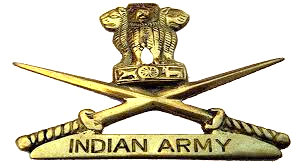
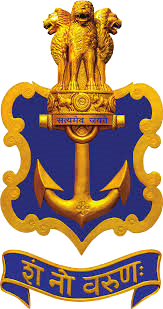
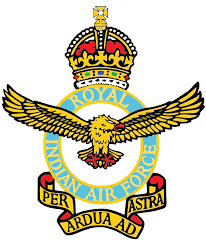
2. AIIMS hospitals in Delhi, Jodhpur, Uttarakhand, Ranchi, etc.
3. AIIMS medical college in Delhi, Jodhpur, Uttarakhand, Ranchi, etc.
4. Government Medical colleges and hospitals like SMS Jaipur, Lilawati in Mumbai, etc.
5. Private Medical colleges and hospitals like Apollo Hospitals.
6. Cancer Hospital and treatment centers.
Work Environment
As a Radiation Oncologist, you would be required to spend most of the time in the laboratory or center. You will work along with medical and surgical oncologists, nurses, paramedicals, radiotherapists, etc. Most of you will have normal working hours. Hours in special medical treatment and procedures, you might be required to spend more than official hours.
Specialisation Tracks In This Career
1. Interventional Radiologist
Interventional Radiologist specializes in imaging, diagnosis, and treatment of patients utilizing minimally invasive interventional techniques. They use this technique for imaging and treatment of the blood vessels (such as angiography, angioplasty, and stent placement), biopsy procedures, line and tube placement, uterine fibroid removal, fluid, and abscess drainage.
2. Nuclear Radiologist
A nuclear Radiologist specializes in imaging, diagnosis, and treatment of patients using trace doses of radioactive material. They use this technique to generate imaging of the heart, the skeletal system, and most organs in the body (for example the thyroid and parathyroid glands, liver, spleen, kidneys, lungs, etc.).
Career Growth
1. The career growth in university and college starts from Assistant Professor and then Associate Professor, Professor and Professor Emeritus. Professors can also get administrative positions such as Director/Dean/Vice Chancellor, etc.
2. If you Join as a Consultant Physician (Duty Officer), then you will go on to become Deputy Medical Superintendent and then Additional Medical Superintendent and then Medical Superintendent. You might also become the director of the Hospital.
3. In private sector hospitals, you can join as a Consultant; then become a Senior Consultant.
4. If you join Army hospitals, then you will move up as per the army ranks starting from Captain (and its equivalent in the Navy and Air Force).
Salary Offered
After completing M.D. / D.N.B. course:
1. At the entry level, one joins as a Consultant Physician and earn about Rs. 80,000 – 1,20,000 a month. With experience, their salary increases.
2. At the junior level with a work experience of 5-6 years, you would be earning anything between Rs. 1,00,000 to 2,00,000 per month.
3. At the middle level with an experience of 8-12 years, you would be earning anything between Rs. 1, 40,000 to 3, 00,000 per month.
4. At the senior level of over 12 years of work experience, you would be earning anything between Rs. 2, 40,000 to 6,00,000 per month or even more.
After Completing D.M. (Medical Oncology) or FRCS/MRCP course:
1. At the entry level, you can earn about Rs. 1, 50,000 – 2, 00,000 a month. With experience, their salary increases.
2. At the junior level with a work experience of 5-6 years, you would be earning anything between Rs. 2, 00,000 to 3, 00,000 per month.
3. At the middle level with an experience of 8-12 years, you would be earning anything between Rs. 2, 50,000 to 5, 00,000 per month.
4. At the senior level of over 12 years of work experience, you would be earning anything between Rs. 3, 00,000 to 12, 00,000 per month or even more.
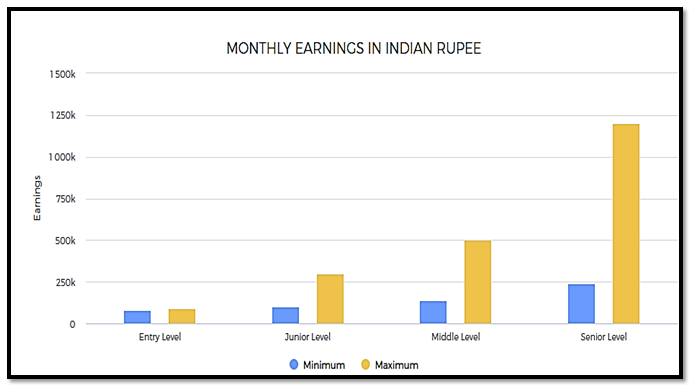
Monthly Earning In Indian Rupee
Entry Level | Junior Level | Mid Level | Senior Level | |||||
Min Earning | Max Earning | Min Earning | Max Earning | Min Earning | Max Earning | Min Earning | Max Earning | |
80000 | 90000 | 100000 | 300000 | 140000 | 500000 | 240000 | 1200000 | |
1. Entry level: 0 - 2 years of work experience
2. Junior Level: From 1 to 12 years of work experience
3. Mid Level: From 5 to 20+ years of work experience
4. Senior Level: From 10 to 25+ years of work experience (there could be exceptions in some high-end technical, financial, engineering, creative, management, sports, and other careers; also in the near future, people will reach these levels much faster in many careers and in some careers, these levels will have no meaning as those careers will be completely tech skill driven such as even now, there is almost no level in a Cyber Security Expert’s job)
Work Activities
As a Radiation Oncologist, you might have different roles and responsibilities. Some of the work activities in these roles are:
1. Assisting & Caring for people - Assisting people in availing of services; taking care of people in different situations; offering help and services to others.
2. Operating machines, equipment, devices, systems and processes - Using various methods and techniques to operate machines, equipment, devices, systems and processes in industrial and other settings.
3. Identifying objects, actions, and events - Identifying various characteristics of objects; observing and understanding actions and events; understanding changes in actions and events.
4. Inspecting equipment, systems, structures, and materials - Inspecting equipment, systems, structures, and materials to ascertain quality, performance, defects, causes of errors, etc.
Future Prospects
Indian Medical industry is growing exponentially riding on strong demand due to rising incomes, greater health awareness and an increase in access to insurance. It might grow to 373 Billion USD in 2022 as per a report by ibef.org. Also, with the introduction of Ayushman Bharat, Insurance and medical benefits are given by the Government of India, and more and more people will start using medical facilities. The hospital industry is expected to 16-17% per year from 2017 to 2022. All these numbers indicate a bright future for Oncologists.

Future Prospects At A Glance
Current (0-1 year) | Long Term (2-5 year) | Very Long Term (6-10 years) |
Very High Growth | Very High Growth | Very High Growth |

